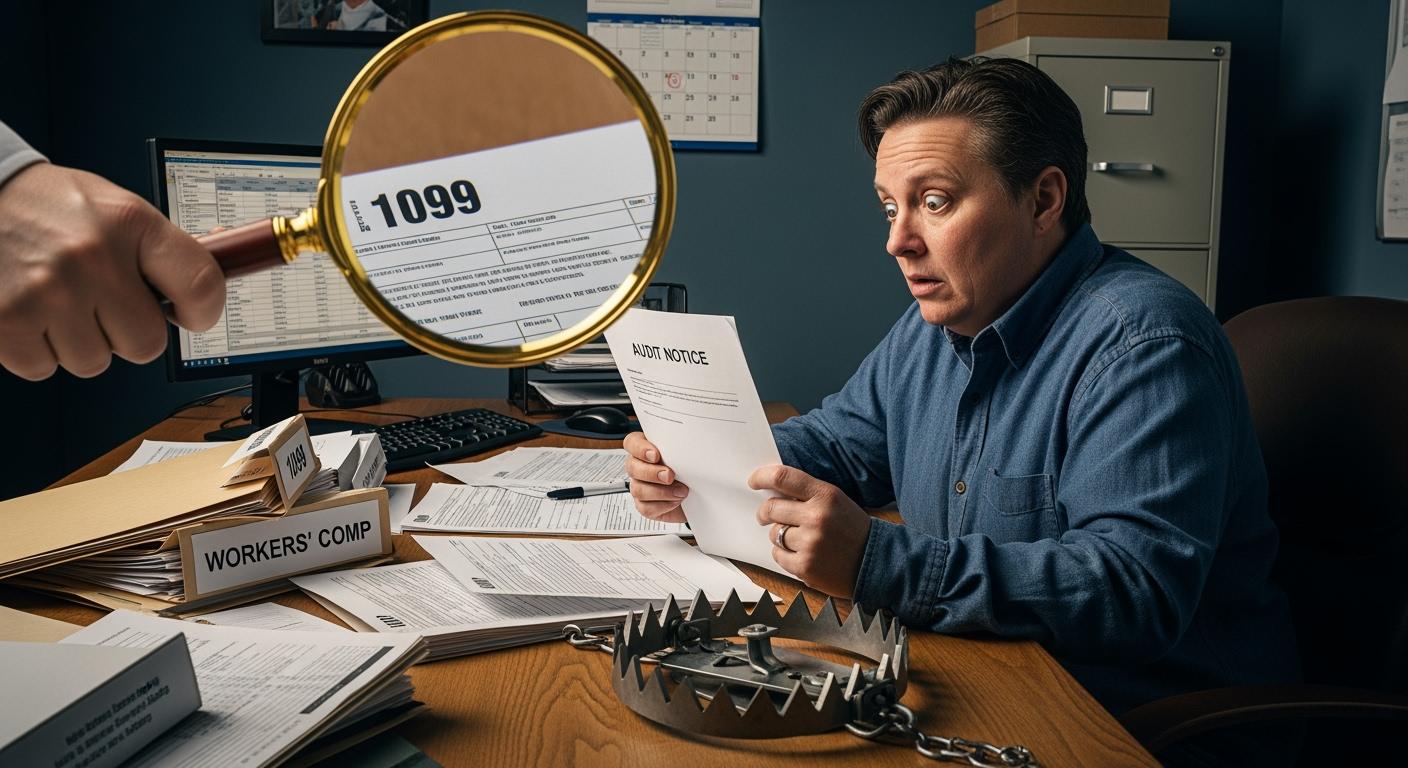
Imagine you have a painting crew in Hilton Head. You finish a big job and pay your 1099 subcontractors. Then you move on to the next job. Months later, you get a surprise bill after your workers compensation 1099 South Carolina audit. If you misclassify your workers, you can get extra costs and problems. Many contractors in Bluffton and the Lowcountry have this issue. If you do not collect certificates of insurance from your subs, you might pay higher premiums. You could also get expensive audit surprises. Think about your own 1099 and subcontractor records. Are you really protected?
Key Takeaways
Always get Certificates of Insurance (COIs) from your 1099 subcontractors. This keeps your business safe from surprise costs during audits.
Know the difference between 1099 contractors and W-2 employees. If you mix them up, you could get fines and pay more for insurance.
Keep your records neat and current. Good paperwork helps you pass audits and stops expensive errors.
Check your insurance and COIs often. If your business changes, you might need to update your policies to follow the rules.
Talk to local experts like GSP Insurance Group. They can help you understand workers’ comp rules and keep your business safe.
The 1099 Contractor Myth
Common Misconceptions
Some people think hiring 1099 contractors is easy. They believe it means no workers’ comp problems. Many small business owners in Bluffton, Hilton Head, and Beaufort think independent contractors get their own insurance. This idea seems simple. But it can cause trouble.
In Georgia, independent contractors do not get workers’ compensation. Sometimes, an employer may give workers’ comp. But they do not have to unless you are a permanent employee. Many small business owners think independent contractors always have workers’ compensation. This is not true.
Let’s look at an example. You run a landscaping crew in Okatie. You hire some 1099 workers for a busy season. You pay them for each job. Then you move on. You think you are safe from workers’ comp claims. But if a worker gets hurt, you might still be responsible. The law cares about how you treat your workers. It does not care what you call them.
Here are some mistakes business owners make:
You call employees independent contractors to save money.
You tell workers how, when, and where to work.
You do not know what makes someone a real independent contractor.
Audit Surprises for Small Businesses
When the yearly audit comes, you might be surprised. Auditors in South Carolina and Georgia check every payment to 1099 contractors. They see if you got Certificates of Insurance (COIs) from each subcontractor. If you do not have proof, your workers compensation 1099 South Carolina policy could get extra charges.
Painters, remodelers, and landscapers in the Lowcountry face these surprises a lot. You think you save money by using 1099s. But missing paperwork or mistakes can mean big bills. Auditors do not care what you meant to do. They look at your records and how you control workers. If you cannot show your subs had their own insurance, you pay more.
Be careful. Check your contracts and COIs before the audit. Protect your business from expensive mistakes.
Workers Compensation 1099 South Carolina: Audit Triggers

How Audits Work
You may think your paperwork is fine, but audits can surprise you. Auditors in South Carolina and Georgia check every payment to 1099 contractors. They want to know if you treated them like real independent contractors. If you controlled their work, they might count as employees. Auditors look at your records, contracts, and payment history. They also check your certificates of insurance.
Here are some things that can start a workers compensation 1099 South Carolina audit:
A 1099 contractor files for unemployment, even if not allowed.
A 1099 worker files a workers’ comp or disability claim. This makes people question their insurance.
You give someone both a W-2 and a 1099 for similar work in one year.
Someone complains to the Department of Labor’s Wage and Hour Division.
A worker files IRS Form SS-8 or Form 8919 to challenge how you classified them.
Someone sends an anonymous tip to the IRS about payroll tax problems.
If any of these happen, your business could get a close audit. Auditors do not just look at your labels. They use state law and see how you manage workers. Insurance companies often play it safe. If they are not sure, they may call your 1099s employees. This can mean extra premium charges and penalties.
COIs and Documentation Gaps
Your paperwork is important. Auditors want to see proof that your 1099 contractors had their own workers’ comp insurance. You must collect valid Certificates of Insurance (COIs) for every subcontractor. The COIs must cover all the time they worked. Missing or expired COIs can cause big trouble.
Here is what auditors check during a workers compensation 1099 South Carolina audit:
Document Type | Description |
|---|---|
1099 Forms | Federal income reports, like 1099 and 1096 forms, unless it is a calendar year audit. |
Subcontractor Invoices | Invoices, contracts, and payment records for labor and materials from each subcontractor. |
Certificates of Insurance | Proof of valid workers’ comp insurance for each subcontractor, covering all work periods. |
If you do not have these papers, you could fail your audit. Some common mistakes are calling workers the wrong thing, using wrong job codes, or making payroll errors. Even a small paperwork mistake can cost you extra money.
Tip: Always keep your COIs neat and current. If you need help, GSP Insurance Group has a COI audit service. You can also learn more about Certificates of Insurance for contractors in Bluffton by visiting Certificate of Insurance for Contractors.
Premium Bill Shock
You might feel good until the audit is over. Then you get a bill. If auditors find missing COIs or wrong worker types, your insurance company may charge you more. They might say your 1099s are employees. This can cost you thousands of dollars you did not expect.
Here are some reasons you might get a big premium bill:
You did not handle your 1099 workers the right way.
You used the wrong employee codes.
You made mistakes in your paperwork or payroll numbers.
Auditors found wrong experience modification (X-Mod) calculations.
Insurance companies in South Carolina often call workers employees if they are not sure. They use state law, not just your contracts. If you call workers the wrong thing, you may owe unpaid workers’ comp and unemployment insurance. This can hurt your cash flow and your business reputation.
Want to protect your business? Schedule a COI audit or ask for a business insurance quote with GSP Insurance Group. Our local team helps contractors and small businesses in Bluffton, Hilton Head, Beaufort, and the Lowcountry follow the rules and avoid big surprises.
Claims, Injuries, and Financial Fallout

Real-World Claim Scenarios
You might think a 1099 worker’s injury is not your problem. In the Lowcountry, this mistake can cost you. Imagine a painter in Bluffton falls from a ladder. He has no insurance. He files a claim against your business. You now face a big bill.
Here are some real situations that have happened in South Carolina and Georgia:
Courts have seen cases where employers faced lawsuits for hiring uninsured 1099 contractors. The Ruh decision in South Carolina made it clear: if you do not check your subs, you could be responsible for their injuries.
Some business owners have faced direct claims for not making sure their contractors had coverage.
If the work is risky, the law expects you to vet your subs even more.
Impact on Premiums and Liability
When a claim hits, your insurance company reviews your records. If you cannot prove your 1099 had their own workers’ comp, your policy may not cover the injury. You could pay out of pocket. Your premiums can jump after a claim. You may also face lawsuits for negligence.
A misclassified worker can challenge their status. If the job is part of your regular business, the worker may count as an employee. This means you owe workers compensation 1099 South Carolina benefits.
Claims do not just cost money. They can hurt your reputation. Future clients may see you as a risk. You may need more coverage, like General Liability Insurance Bluffton SC, to protect your business from lawsuits.
Ripple Effects on Your Business
A single claim can ripple through your business. You may lose jobs if your insurance costs rise. Cash flow can suffer. You might spend hours fixing paperwork and dealing with audits. Your team may worry about job security.
Tip: Protect your business by reviewing your 1099 and COI records now. GSP Insurance Group can help you avoid these headaches. Request a business insurance quote today.
Misclassification and IRS Risks
Worker Status: 1099 vs W-2
Some people think calling a worker a 1099 contractor is easy. But the law cares about how you treat your workers. It does not just look at what you call them. If you tell a worker how, when, and where to work, they might be an employee. This is important for businesses in Bluffton, Hilton Head, and the Lowcountry.
In South Carolina, courts use four things to decide if someone is an employee or a contractor. They look at your control, who gives tools, how you pay, and if you can fire the worker. The Lewis v. L. B. Dynasty case made these rules even tougher for bosses.
Georgia uses the ABC test. You must show:
The worker is free from your control.
The work is not part of your main business.
The worker has their own trade or business.
If you miss any part of this test, the state may call your 1099 a W-2 employee. This can mean audits, fines, and back taxes.
Here is an example. You run a remodeling business in Beaufort. You hire a carpenter as a 1099. You set his hours, give him tools, and watch his work. Even if you pay him as a 1099, the law may say he is your employee. This can cause big trouble during a workers’ comp or IRS audit.
IRS Penalties and Payroll Issues
Misclassifying workers can cost more than you think. The IRS and state agencies take this very seriously. If you treat a worker as a 1099 but the law says they are an employee, you could face:
Owing unpaid overtime and minimum wage under the Fair Labor Standards Act (FLSA)
Civil penalties for unpaid wages, extra damages, and attorney’s fees
Fines for not paying payroll taxes, like Social Security and Medicare
Penalties for breaking state workers’ comp laws and not paying premiums
Owing up to 1.5% of unpaid wages and up to 25% of unpaid taxes
You might also have wage disputes, tax bills, and lawsuits. These problems can hurt your cash flow and your reputation in the Lowcountry. To learn more about protecting your business, visit Workers Compensation for Small Businesses.
Misclassifying workers can bring big fines, wage fights, tax bills, and lawsuits.
If a worker says you treated them unfairly, you could face employment practices liability claims. These claims can be for firing, discrimination, or wage problems. For more protection, think about EPLI for Small Employers.
Documentation Consistency Matters
Keeping your paperwork neat is your best defense in an audit. You need to make sure your contracts, payroll, and tax forms all match. If your records do not match, auditors may see a problem.
Aspect | Importance |
|---|---|
Consistency in Reporting | Makes sure records match Form 941 so audits do not happen. |
You must keep organized and complete records. This means contracts, payment records, and Form 941 filings. If you get audited, you want to show you followed the rules. Good paperwork can help you avoid back taxes and fines.
Make sure your contracts say if the worker is a contractor or employee.
Double-check your payroll and tax forms for mistakes.
Keep all Certificates of Insurance up to date.
If you need help checking your records or want to avoid mistakes, GSP Insurance Group can help. Request a business insurance quote today and let our local team help you follow the rules.
Staying Compliant in the Lowcountry
Verifying Subcontractor COIs
You want to keep your business safe from audits. Start by checking every subcontractor’s Certificate of Insurance (COI). Do not take just any paper. Only ACORD 25 forms are real COIs in the Lowcountry. Get COIs straight from the insurance company. This helps you avoid fake or old paperwork.
Best practices for COI verification:
Take only ACORD 25 forms.
Make sure the insurance company is real and strong.
Watch out for strange fonts or handwriting.
Call the insurance company to check coverage and dates.
Use online tools to track COIs and get renewal alerts.
Tip: Never take a copy or a COI given by a subcontractor. Always check with the insurance company.
Building a Compliance Checklist
You need a simple list to keep your records neat. This helps you get ready for audits and keeps your business safe from mistakes.
Compliance Step | Why It Matters |
|---|---|
Collect valid COIs | Shows subs have their own insurance |
Check contracts for accuracy | Proves worker status is clear |
Match payroll and tax forms | Stops misclassification |
Track COI expiration dates | Prevents gaps in insurance |
Use COI verification software | Sets reminders and stores documents |
Go through each step before starting a new job. Update your records often. This keeps your business safe and ready for audits.
Regular Reviews with GSP
You cannot buy insurance and forget about it. Your business changes. Risks change too. Your coverage should change with them.
Business insurance is not something you buy once and ignore because your work changes, risks change, and your coverage should change too. If it does not, you may pay for things you do not need or leave your business open to problems.
Set up regular reviews with GSP Insurance Group. Our local team knows Bluffton, Hilton Head, Beaufort, and the Lowcountry. We help you find gaps, update your insurance, and stay compliant. You get peace of mind and avoid big surprises.
Ready to protect your business? Contact GSP Insurance Group today to set up your insurance review. Stay compliant, stay confident, and keep your business strong.
Your Local Insurance Partner
GSP’s Support for Small Businesses
You want someone who knows your business and town. GSP Insurance Group helps contractors and small businesses in Bluffton, Hilton Head, Beaufort, and Okatie. They help with workers’ compensation, risk management, and insurance checkups. GSP works with you to keep your business safe and following the rules.
You get these benefits:
Regular risk checks to find problems early.
Insurance plans made just for your business.
Training for workers to help stop accidents.
Emergency plans to keep your team ready.
GSP helps you make a safety plan and keeps your papers neat. They give advice about classifying workers and getting COIs. You feel ready when audit time comes.
Why Local Expertise Matters
Local insurance knowledge helps your business a lot. Workers’ compensation rules are different in each state. You need someone who knows South Carolina and Georgia laws. GSP works with many insurance companies to get you good coverage and prices.
You get help with loss control and risk prevention to lower costs.
GSP watches your risks and changes your insurance as you grow.
You get advice about pay-as-you-go plans that match your payroll.
Local agents know the jobs you do and the risks in the Lowcountry. They give advice that fits your business, not just general tips.
Schedule Your Review Today
You want to feel safe about your business. GSP Insurance Group is “A Partner for Your Journey” in Bluffton, Hilton Head, Beaufort, and Okatie. You can set up a business insurance review and get a COI audit. This protects your business, your workers, and your future.
Ready to get started? Contact GSP Insurance Group. You get local experts, friendly service, and a team that cares about your success. Let GSP help you follow the rules and feel confident.
If you do not pay attention to 1099s during workers’ comp audits, you could get into trouble. You can keep your business safe by doing a few smart things:
Always keep your payroll and job records up to date.
Make sure you get certificates of insurance from every subcontractor.
Check your paperwork and update COIs before each new job.
Checking your insurance often helps you find problems early. This way, you are ready for audits and do not get big surprise bills. GSP Insurance Group helps people in Bluffton, Hilton Head, Beaufort, and the Lowcountry. You always have “A Partner for Your Journey.” 😊
FAQ
What happens if I do not collect a Certificate of Insurance (COI) from my 1099 subcontractor?
You may have to pay extra for workers’ comp. Auditors can treat your 1099 as an employee. This can lead to higher insurance bills and possible fines.
How do I know if my worker should be a 1099 or a W-2?
Look at how much control you have. If you set hours, provide tools, or direct the work, the law may see the worker as an employee. Always check state rules.
Can a 1099 contractor file a workers’ comp claim against my business?
Yes. If your 1099 does not have their own insurance, you could be responsible for their injury. This can raise your costs and hurt your business.
What paperwork should I keep for each subcontractor?
Keep signed contracts, payment records, and up-to-date COIs. Make sure all documents match. Good records help you pass audits and avoid problems.
How often should I review my insurance and COIs?
You should review your insurance and COIs before every new job. Set reminders to check expiration dates. Regular reviews help you stay compliant and avoid surprises.
See Also
Understanding Gap Insurance: The $8,000 Importance You Overlook
